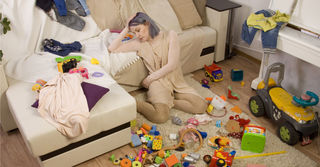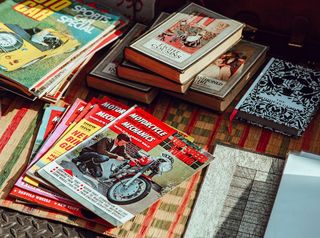Guilt
Why Is It Hard to Give Away Things We Own?
Four ways to be kind to yourself when letting go of what you don’t need.
Posted March 12, 2018

My mother came to my house with bags of my grandmother’s possessions. Given my New Year’s intention to let go of things, the bags represented an unwanted reversal of my simplifying life project. The clothes, her doll collection, and the many doilies are all things I do not need to lead a complete and fulfilling life. Still, I experienced a strong emotional pull to keep these things because they connected me to my grandma.
Even before those bags arrived, I was already astonished by two clear experiences that had resulted from my signing up for the online “Simple Year” program, which is designed to help people like me simplify closets, email, finances, and life:
1. Committing 10-15 minutes a day to the task of simplifying some aspect of my household was surprisingly effective: I have given away 20 boxes of stuff already, with more to go.
2. My attachment to things is irrationally strong. This includes Legos, small pieces of paper, and other mundane items.
Why is it so hard to give things away?
As a researcher, I looked at the literature to figure out why getting rid of stuff was so hard. From a cognitive perspective, there is ample evidence that we are biased to value the things that we possess. Research on the mere exposure effect shows that the more we are exposed to something, the more it will become favorable to us (Zajonc, 1968). This is true of things we hear, see, read, name, create and meet (Borstein, 1989). Research on loss aversion shows that we are biased to keep things we have even when we would make no effort to acquire them if we didn’t already have them (Kahneman & Tversky, 1986). And the research on the status quo bias shows that any decrease from the status quo is perceived as a loss, even when there are financial advantages to selling or changing what we already possess (Kahneman, Knetsch, & Thaler, 1991).
However, cognitive biases are not the whole story.
Decision-making is surprisingly emotional.
Both immediate and expected emotions influence decision-making about what to keep or release (Rick & Loewenstein, 2008). To get a sense of what I’m describing, all you have to do is pick up a potentially useful or sentimental item and try to place it in the trash, recycling or give away box. What do you feel? I can attest to feeling quite a lot of emotions that surprised me. Here are some examples:

- Guilt. Yes, I did spend good money on that thing. Yes, I really should have used it more. If I leave it in the drawer for another ten years, it might get used. And yes, guilt is a bad reason to keep it.
- Sadness. If I give away my grandmother’s cherished dolls (60 of them!), am I also giving away my memory of my grandmother and all she meant to me? Honestly, it kind of feels that way.
- Fear. Turns out I live in southern California and own 24 coats. I feel clear I do not need to own that many, and yet I fear not being prepared if I concede my heavy wool (not used since 1997 when I moved from Boston) coats.
- Happiness. I spent years nursing and holding my children while wearing that baby sling, but the reality is that I will not need it again. I feel if I give this away, I will lose the many happy moments that occurred when I used it.
- Love. In my drawers beneath my clothes, stuck in books, and hidden in boxes, I have loads of cards and letters that convey people’s sweet words and sentiments that I never want to lose because ultimately, I want proof and reminders that I am loved.
Simplifying and decluttering is emotional work.
Four ways to be kind to yourself when letting go of things
1. Recognize that our brains are wired to overvalue what we possess (almost instantly). This is true even when we no longer need the stuff we own.
2. Let time loosen attachment. Letting go of things is a process, so sometimes it helps to just stick things in a box in the garage for a couple of months and then see if it is easier to release them later.
3. Know some things are worth keeping. As part of my grandmother’s things, I was given love letters between her and my grandfather written during WWII. Beautiful and sweet, I won’t give them away. Yes, they also convey a second lesson which is that love isn’t held in a letter, it ultimately survives in our hearts.
4. Find ways to let go of guilt, sadness, and fear and keep the happiness and love regardless of what you do or do not possess.
No object holds the power to protect me from the negative emotions I sometimes feel, such as guilt, sadness, and fear. And no object can keep me forever connected to the positive emotions I want in my life, such as happiness and love. We are all alchemists, able to imbue our things with powerful emotions and protections. But if we remember that we have this power, then we can also reclaim possession of our emotions and disentangle them from the objects cluttering up our lives. This is a great kindness to myself, regardless of whether I keep or let go of the item.
References
Baron, J. (2007). Thinking and deciding (4th ed.). New York City: Cambridge University Press. ISBN 9781139466028.
Bornstein, R.F. & Crave-Lemley, C. (2004). "Mere exposure effect". In R. F. Pohl (Ed.) Cognitive Illusions: A Handbook on Fallacies and Biases in Thinking, Judgement and Memory (pp. 215-234). Hove, UK: Psychology Press.
Kahneman, D. & Tversky, A. (1986). Norm theory: comparing reality to its alternatives. Psychological Review, 93, 136-153.
Kahneman, D., Knetsch, J L. & Thaler, R. H. (1991). Anomalies: The Endowment Effect, Loss Aversion, and Status Quo Bias. Journal of Economic Perspectives, 5 (1), 193–206. doi:10.1257/jep.5.1.193.
Rick, S. & Loewenstein, G. (2008). The role of emotion in Economic Behavior. In M. Lewis, J. M Haviland-Jones & L. F. Barrett (Eds), Handbook of Emotions, 3rd Ed. (pp. 138-156). NY: Guilford Press.


